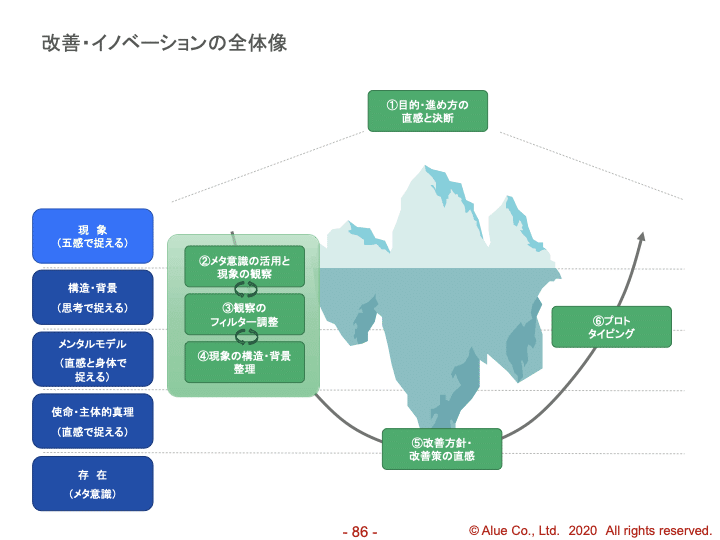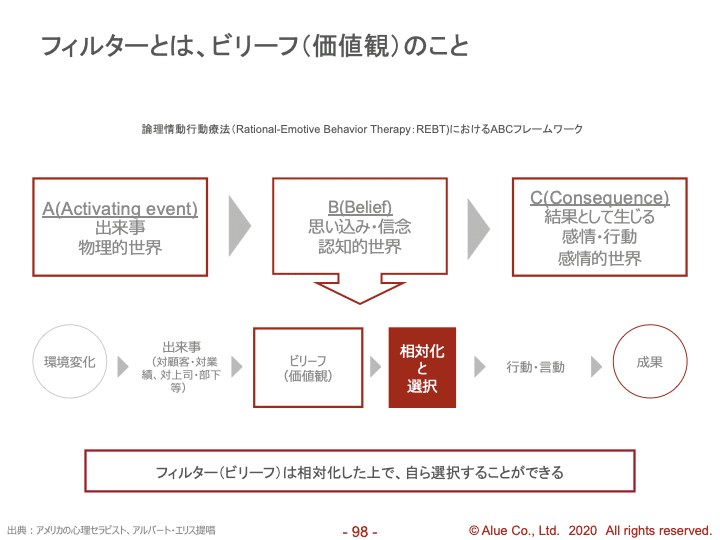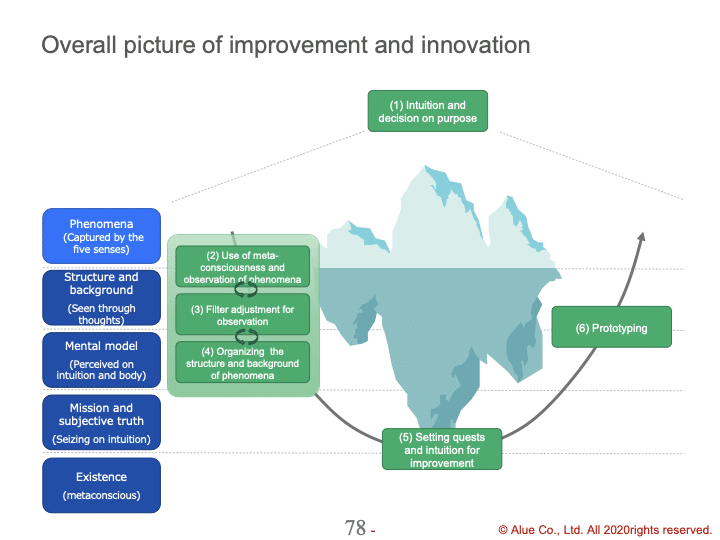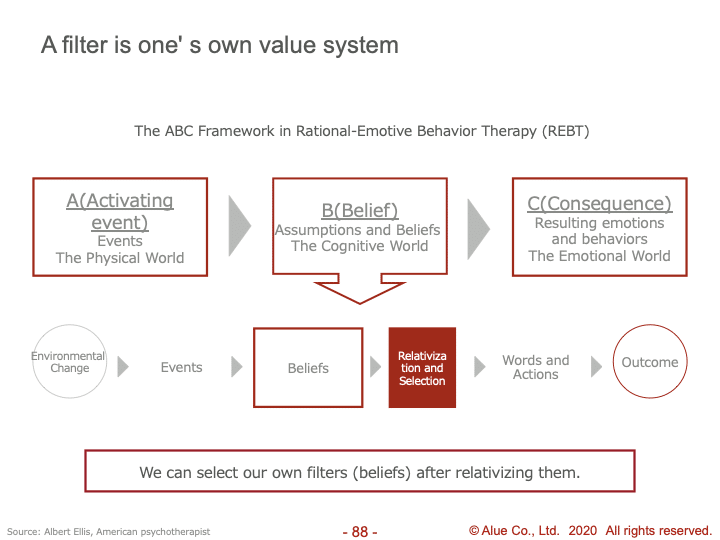
自分の認知の「眼鏡」に気づけているか?
前回の記事では、改善・イノベーションの二つ目のプロセスである「メタ意識の活用と現象の観察」をテーマとして、現象をありのままに観察するときに、複数の観察モードを持つことが大切であることをお伝えしました。
今回の記事では、改善・イノベーションの三つ目のプロセス「観察のフィルター調整」についてお話しします。

どんな「眼鏡」をかけているかに自覚的になる
③観察のフィルター調整
チームメンバー一人ひとりがフィルター(認知と判断の前提)をメタ認知し、調整する場づくりをする
改善・イノベーションプロセスの一つ目のプロセスにおいては、どの範囲において改善・イノベーションをするかについて意図的に選択しました。その選択した範囲における「現実」をありのままに捉えるというのが、二つ目のプロセスでしたが、このプロセスと同時並行的に実践する必要があるのが、観察のフィルター調整という三つ目のプロセスです。
詳しくは後ほどご説明いたしますが、観察のフィルターと言うのは「眼鏡」のようなものです。 前回の記事において、現象をありのままに観察するのはとても難しいということをお話しいたしましたが、 それは私たちが物事を見るときに何らかの「眼鏡」を通して解釈をしながら見ているということだからです。

「眼鏡」があることがよくないということではありません。もし、「眼鏡」がなければ、一つひとつの事象を判断するための時間がかかりすぎてしまうことでしょう。りんごをみても「りんご」とすぐには判断することができず、「丸く赤い光がみえている」というところに留まってしまうことでしょう。これでは、普段の生活が成り立ちにくくなってしまいますね。
ただ、「眼鏡」をかけていることに対して無自覚な場合、現象を自分に都合よく解釈してしまったりすることによって、本来の自分の目的やあり方とは反した言動につながってしまうことがあります。家族や友人などの大切な人の言動を誤解してしまい、後悔したことがある人は少なくないのではないでしょうか。
ですから、どんな眼鏡をかけているかについて自覚的になり、さらには、その眼鏡を状況に応じて選択したり調整できたりすることで、本来の自分の目的やあり方に沿ったものにしていくことが望ましいと言えます。
フィルターとは、自分の価値観のこと
ここまで、眼鏡というメタファーによって、フィルターについて説明をしましたが、フィルターとは何かをもう少し詳細に説明したいと思います。

アメリカの心理セラピストであるアルバート・エリスが提唱した論理行動療法(Rational-Emotive Behavior Therapy: REBT)にABCフレームワークと呼ばれるものがあります。このフレームワークによれば、出来事(Activating Event)に対して感情(Consequence)を抱く時に、出来事と感情が直接的に結びついているのではなく、信念・価値観(Belief)が間に挟まって、出来事と感情を結びつけています。
例えば、仕事のアウトプットについて上司からフィードバックを受けた(A)とします。このときに、フィードバックをもらうことは仕事の質を高めるし、自分の成長にもつながので良いことだという価値観(B1)を持っていれば、
もらったフィードバックを前向きの捉えることができる(C1)でしょう。
一方で、同じ状況において、フィードバックをもらうことは自分の仕事が不適切であるということなので良くないことだという価値観(B2)を持っていれば、もらったフィードバックを前向きに捉えることができない(C2)かもしれませんね。

同じ出来事・状況であったとしても、信念・価値観の違いにより、結果として得られる感情や心象が異なります。この信念・価値観(ビリーフ)が、先ほどの話における「眼鏡」であり、フィルターです。
フィルターはどのように形成されるか
さて、このフィルター(ビリーフ)は、どのように形成されるのでしょうか。この形成過程を知っておくことが、自らのフィルターに自覚的になり、自己調整することができるようになるヒントを与えてくれます。
フィルターの形成過程には2種類あります。一つは、個の生存戦略として過去の経験を通じて培われた過程、もう一つは主体的真理や願いなどによって涵養されてきた過程です。
個の生存戦略として過去の経験を通じて培われた過程というのは、過去の経験において繰り返されてきた事象に対して不快感情を少なくし、快感情を多くするための価値観を形成する過程と言えます。
人なら誰しも(動物も恐らく同じでしょう)、不快感情を少なくして、快感情を多くすることを望みます。人や動物は、生存に必要なものには快感情を、生存にマイナスのものやリスクのあるものには不快感情を持ちますから、不快感情を少なくして快感情を多くするということは、個の生存戦略として自然であると言えます。
それを実現するために、繰り返されておこる出来事(A)に対して、最適な価値観(B)を形成することによって、不快感情を少なくし、快感情を多くする(C)ように自己調整していく過程とみなすことができます。
人にとっての不快感情の代表的なものは、周囲との関係性の悪化です。これは、幼少期における家族との関係性や、青年期における友人との関係性の重要性を考えれば明らかです。ですから過去の経験から培われる価値観の中でも、周囲との関係性を良好に保つために形成されてきたものは多くあります。

それは、幼少期から今に至るまで、家族・友人などの周囲との関係性の中で、自分にとって必要な支援を受けることができたり、自分にとって必要な関係性を結ぶことができるようになるために、意識的・無意識的に形成されてきた価値観です。
もう一つのフィルターの形成過程は、主体的真理や願いによって涵養されるものです。先ほどのこの生存戦略として過去の経験を通じて培われた過程というのも、願いの一つであるという見方もできますが、ここでの主体的真理や願いというのは、生存欲求よりも高次の欲求である自己実現欲求を想定しています。

平たく言えば、自己のありたい姿に近づくために、自分の価値観を形成していくことと言えます。例えば、一流のプロ野球選手(例:イチロー選手や大谷選手)が、インタビューを受けている場面などを見ると、自分なりの価値観を明確に持っていることに気づくのではないでしょうか。それらの価値観は、彼らが高みを目指す過程において培われてきたものなのではないかと思います。
これら2つの形成過程があることを知ることによって、フィルター調整をするためには、これまでの経験から培われた価値観について自覚的になり、自分の願いに立ち返った上で、その価値観をどのように調整するかを選択していくことが必要なことがわかります。
次回の記事では、どのようにすればフィルター調整をすることができるのかについてお話しします。
本日の問いとなります。(よろしければ、コメントにご意見ください)
・あなたが最近、ご自身の価値観に自覚的になったことがあったとすれば、それはどのようなタイミングで、どのような価値観に気づきましたか?
・その価値観をあなたが持つようになったのは、どのような過去の経験と結びついていますか?あるいは、どのような願いと結びついていますか?
Are you aware of the "glasses" of your cognition?
In my previous article, I talked about the second process of improvement and innovation, "Utilizing Meta-consciousness and Observing Phenomena," and how it is important to have multiple modes of observation when observing phenomena as they are.
In this article, I will talk about the third process of improvement and innovation: filter adjustment for observation.

Be aware of what kind of "glasses" we are wearing.
(3) Filter adjustment for observation
Create a context in which each team member can meta-cognize and adjust their filters (cognitive and judgmental assumptions).
In the first process of improvement and innovation, we intentionally chose the scope of improvement and innovation. The second process was to observe the "reality" in our selected scope as it is. The third process, which needs to be practiced in parallel with the second process, is to adjust the filters of observation.
As I will explain in detail later, the filter of observation is like a pair of glasses. In my previous article, I mentioned that it is very difficult to observe phenomena as they really are, because we are looking at things through some kind of "glasses" while interpreting them.
This is not to say that having "glasses" is a bad thing. If we didn't have " glasses ", it would take too much time to judge each event. Even if you see an apple, you will not be able to immediately determine that it is an apple, but will only be able to see a round red light. This would make it difficult to live a normal life.
However, if we are unaware of the fact that we are wearing "glasses," we may interpret the phenomena to our own advantage, which may lead to words and actions that are contrary to our original purpose and way of being. Many people may have regretted misinterpreting the words and actions of their family members, friends and other loved ones.
Therefore, it is advisable to be self-aware about what kind of glasses we wear, and moreover, to be able to choose and adjust those glasses according to the situation, so that we can make them in line with our original purpose and way of being.
A filter is one' s own value system.
So far, I have explained filters through the metaphor of glasses, but I would like to explain what a filter is in more detail.

In Rational-Emotive Behavior Therapy (REBT), proposed by American psychotherapist Albert Ellis, there is a framework called the ABC Framework. According to this framework, when we feel an emotion (Consequence) in response to an Activating Event, there is not a direct connection between the event and the emotion, but rather a belief/value system (Belief) is placed in between to connect the event and the emotion.
For example, let's say you receive feedback from your boss on your work output(A). If you have the sense of value that receiving feedback is a good thing because it improves the quality of your work and helps you grow(B1), you will be able to regard the feedback positively(C1).
On the other hand, in the same situation, if you have the value that receiving feedback is a bad thing because it means that your work is inappropriate(B2), you may NOT be able to regard the feedback in a positive way(C2).
Even if the events and situations are the same, the resulting emotions and mental images will be different depending on the differences in beliefs and values. These beliefs and values (beliefs) are the "glasses" or filters in the previous discussion.
How is the filter formed?
So, how are these filters (beliefs) formed? Knowing this formation process will give us a hint to become more aware of our filters and to be able to self-adjust.
There are two types of filter formation processes. One is a process cultivated through past experiences as an individual survival strategy, and the other is a process cultivated through subjective truths and wishes.
The process of cultivating through past experiences as a survival strategy for the individual is the process of forming values to reduce unpleasant feelings and increase pleasant feelings in response to repeated events in past experiences.
Every human being (and probably animals too) wants to have fewer unpleasant feelings and more pleasant feelings. Since people and animals have pleasant feelings toward things that are necessary for survival and unpleasant feelings toward things that are negative or risky for survival, it is a natural survival strategy for individuals to minimize unpleasant feelings and maximize pleasant feelings.
In order to achieve this, it can be regarded as a process of self-adjustment to reduce unpleasant feelings and increase pleasant feelings (C) by forming an optimal sense of values (B) in response to repeated events (A).
One of the most common unpleasant feelings for people is the deterioration of their relationships with those around them. This is obvious when we consider the importance of relationships with family in childhood and with friends in adolescence. Therefore, there are many values that are cultivated from past experiences that have been formed to maintain good relationships with the people around us.
It is a value system that has been formed consciously and unconsciously from childhood until now, in order to be able to receive the support that we need and to be able to form the relationships that we need with our family, friends and other people around us.
The other process of filter formation is one that is nurtured by subjective truths and wishes. Although the process of cultivating through past experiences as a survival strategy can be seen as a kind of wish, the subjective truth or wish here is the desire for self-actualization, which is a higher level of desire than the desire for survival.
In layman's terms, it can be said to be the process of forming one's own values in order to get closer to what one wants to be. For example, if we watch top-notch professional baseball players (e.g., Ichiro and Otani) being interviewed, we may notice that they have a clear sense of their own values. I believe that these values have been cultivated in the process of their pursuit of greatness.
Knowing that there are these two formative processes, we can see that in order to adjust our filters, we need to become more aware of the values we have developed through our experiences, reflect on our wishes, and then choose how to adjust those values
In the next article, we will talk about how we can adjust the filter.
Here are the quests of the day. (If you'd like, please share your thoughts in the comments.)
・If you have recently become more aware of your values, when did you become aware of them and what values?
・What past experiences have led you to hold these values? or what kind of wishes are connected to these values?
Bunshiro Ochiai
この記事が気に入ったらサポートをしてみませんか?
